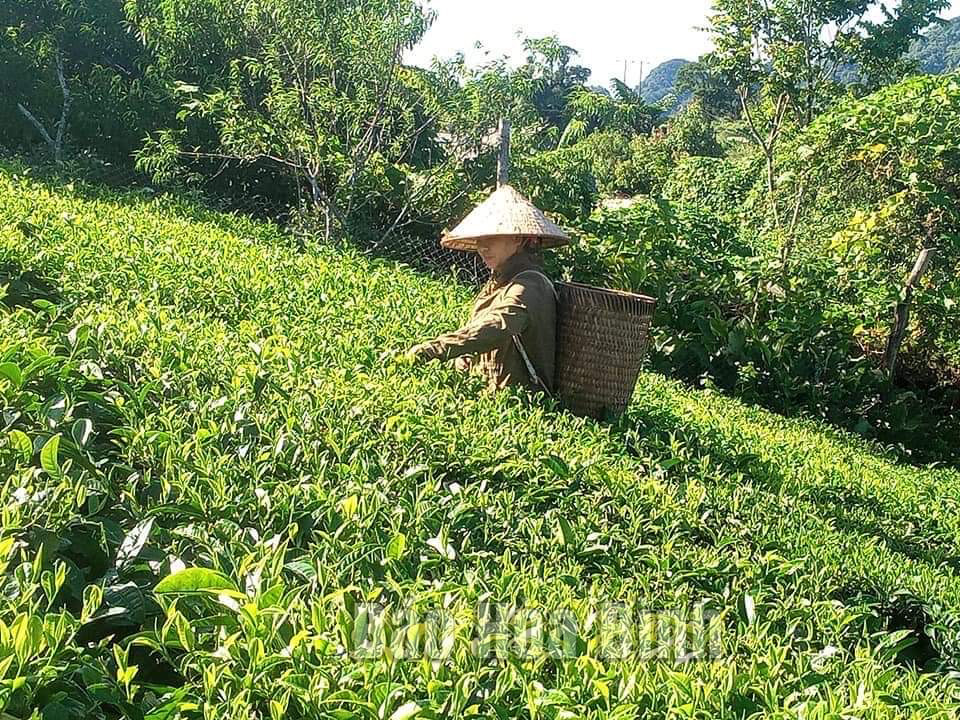
(HBO) - Not only blessed with a cool climate and beautiful landscapes, Pa Co commune in Mai Chau district is also renowned for its centuries-old Shan tuyet tea trees. Local residents have taken efforts to preserve the local unique traditional tea processing method to create a distinctive flavour that cannot be found anywhere else.

![]() Dung Y Thuy’s
family in Cha Day hamlet, Pa Co commune plants nearly 1.5ha of tea trees, which
brings a stable income of 200 -250 million VND (8,500 – 10,600 USD) each year.
Dung Y Thuy’s
family in Cha Day hamlet, Pa Co commune plants nearly 1.5ha of tea trees, which
brings a stable income of 200 -250 million VND (8,500 – 10,600 USD) each year.
Preserving traditional craft
Growing tea trees has been a part of the daily
life and culture of the Mong people in Pa Co for hundreds of years, and the tea
production sector also evolved from that.
The tea production process has become much
simpler with the support of machinery. However, many households in Pa Co still
preserve the traditional manual tea roasting method.
To produce a quality batch of tea, it is
recommended to pick the leaves early in the morning before 10 am and after 3
pm, said Sung Y Thuy in Cha Day hamlet.
Pa Co tea specialty
For a long time, Pa Co dried tea has been
popular in and outside the province, commanding a relatively high price. The
product has helped improve the livelihoods of local tea growers.
Planting tea trees not only brings high economic
value but also contributes to promoting experiential tourism development in the
locality.
Visitors to Pa Co are often amazed at and
delighted to explore ancient tea trees, and experience the traditional tea
production process of the Mong people community.
Nguyen Van Khanh from Hanoi said he is impressed
at the traditional tea production process of Mong people in Pa Co.
Phang A Song, Chairman of the Farmers'
Association in Pa Co commune said the tea roasting process takes a considerable
amount of time.
"It takes 2-3 hours to produce a delicious and
flavourful tea products that embodies the sweet and bitter taste of Pa Co tea”,
he said.
Developing Pa Co tea brand
Pa Co commune is home to 82ha of tea, including
over 200 ancient Shan tuyet tea trees. Thanks to the natural care process, the
ancient trees generate good-quality products, bringing high income to local
farmers.
The Standing Board of the Hoa Binh provincial Party Committee has agreed in principle on a proposal by the Standing Board of the Party Committee of Hoa Binh city to gather feedback on the city’s 1:2000 zoning plan, which forms part of its broader urban development strategy.
Hoa Binh province has made notable progress in public administration reform and digital government development, with the satisfaction index among citizens and businesses reaching over 84%, according to recent government evaluations.
Thanks to great efforts by local authorities in recent times, the governance and public administration performance of Mai Chau district has been significantly improved.
In the afternoon of June 6, the Party Committee, the People's Council, the People's Committee and the Fatherland Front of Lac Son district solemnly held a meeting to celebrate the 139th anniversary of the district's founding (1886–2025) and the 79th anniversary of the establishment of the district's Party Committee (1946–2025). There was the attendance of Mr. Bui Van Thang, the Vice Chairman of the Provincial People's Council; Mr. Quach Tat Liem, the Vice Chairman of the Provincial People's Committee; Ms. Dang Bich Ngoc, the Deputy Head of the National Assembly Delegation of the province; as well as the former leaders of the province and district through various periods, who are the natives of the district.
Implementing the Politburo’s Resolution No. 57-NQ/TW on breakthroughs in science – technology, innovation, and digital transformation is a golden opportunity for the northern mountainous province of Hoa Binh to renew growth model, improve competitive edge and shorten digital gap.
Resolution 57-NQ/TW, issued by the Politburo on December 22, 2024, identifies sci-tech, innovation, and digital transformation as strategic breakthroughs to build a developed and prosperous nation. In Hoa Binh province, this spirit is not just a slogan, it’s being put into action through concrete initiatives that form a "new development triangle”: digital citizenship, digital economy, and digital administration.



